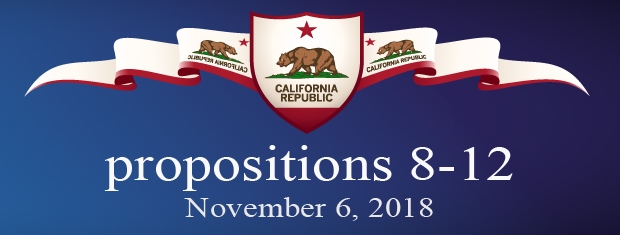California Ballot Guide 2018: Propositions 8-12
We continue with Part Three in our series on California’s ballot propositions for 2018, providing a glimpse of the pros and cons of each measure. For those readers who want more than a glimpse, please click on the source links for more information.
To catch up on initiatives we covered earlier, please see Part 1 in this series re California Propositions 1-4, or go to Part 2, state Propositions 5-7.

Proposition 8: Limits on Dialysis Clinics’ Revenue and Required Refunds Initiative, a/k/a Amendment to the Fair Pricing for Dialysis Act
This is a bill to amend California’s Health and Safety Code, in an effort to curb the costs of kidney dialysis by limiting revenue for the companies that provide such services – and by requiring those companies to issue certain refunds to dialysis patients or their insurers. The bill would impose a limit based on a “fair treatment amount,” defined as 115 percent of the sum of all direct patient care services costs and all health care quality improvement costs incurred by a governing entity and its chronic dialysis clinics.
Translation: Dialysis companies may not charge more than 115 percent of costs for drugs, medical supplies, clinic upkeep and staff overhead.
If the companies do overcharge, they will be mandated to issue refunds within 90-210 days of the end of the company’s fiscal year, if the rebate is more than $20, starting in 2019. After January 1, 2020, dialysis companies will pay the rebate with interest.
Voting Yes on Prop 8:
Groups that support Proposition 8 tend to be on the left, and include the California Democratic Party and various unions. They claim two primary companies, DaVita and Fresenius, practically have a monopoly on the dialysis industry, raking in nearly $4 billion in profits annually. Proponents cite a 350 percent markup over costs of treatment for patients with private insurance coverage – which only serves to drive up the costs of insurance. Despite the profits, patients complain of deplorable clinic conditions.
Voting No on Prop 8:
The main opponents of Proposition 8 seem to be medical groups and associations who claim the caps on dialysis company revenue could force the company to cut services and close up community clinics, thus preventing patients from receiving critical care. Other opponents contend this is a payback effort by certain labor organizations to drastically reduce profits of the two aforementioned companies – primarily because those companies have resisted union efforts to organize clinic employees.
Proposition 9: Three States Initiative, a/k/a Cal 3 Initiative
No one will be voting on this, as the measure was removed from the ballot by order of the Supreme Court of California on July 18, 2018. (This was the initiative to petition Congress to split California into three separate states.)
Proposition 10: Expands Local Governments’ Authority to Enact Rent Control on Residential Property, a/k/a Affordable Housing Act
Prop 10 intends to slow or stop skyrocketing housing rents by repealing the 1995 Costa-Hawkins Rental Housing Act which gave landlords the ability to raise rents to any amount in buildings constructed after 1995. Under Costa-Hawkins, rents on units in older, rent-controlled buildings may be raised to market value when tenants vacate.
Voting Yes on Prop 10:
The Yes on 10 groups claim California cities and counties should be free to regulate rental pricing – more local government control should be granted to help alleviate problems specific to individual locales. The measure will allow smaller governments to explore creative solutions to the housing problem. According to some sources, Los Angeles has nearly 60 thousand homeless people living without shelter – many of those are families with children, or seniors or college students. Others are being forced to live far from where they work, compounding traffic issues and taking tolls on health because of stress related to longer commutes.
Voting No on Prop 10:
Those who contest Proposition 10 say this measure is not the answer, as the initiative will reduce property values for families who rent guest homes or single rooms. Additionally, the initiative will discourage housing developers from initiating new residential construction projects, making housing less available and less affordable. Last, Prop 10 is flawed, as there are no guarantees of reduced rents, no funding for affordable housing, and no protections for renters, seniors, veterans or the disabled. In short, it fails to provide a solution to California’s homeless crisis.
Proposition 11: Requires Private-Sector Emergency Ambulance Employees to Remain On-Call During Breaks. Eliminates Certain Employer Liability, a/k/a Emergency Ambulance Employee Safety and Preparedness Act
This measure seeks to bolster public health and safety by ensuring ambulance and paramedic personnel and Emergency Medical Technicians (EMTs), receive proper training; certain mental health benefits; and paid, on-call meal and rest break time. It also seeks to ensure such emergency personnel are available at all times in case of natural catastrophe or other emergency situations.
Voting Yes on Prop 11:
Advocates for Prop 11 contend nearly three quarters of the state’s population rely on private emergency service companies for help in the event of natural disasters, active shooter incidents and other situations that require immediate medical responses. However, due to California’s strict employment laws and trends by courts making pro-employee decisions, the closest first responders from these private companies may not be reachable while on meal or rest breaks. Prop 11 will allow private company first responders to receive an extra hour of pay if responding to an emergency while on break which will encourage employers to hire enough staff to cover proper breaks. Additionally, the initiative requires mandatory health coverage and annual mental health/wellness training for EMTs and the like. All of this will contribute to better mental/physical health for emergency personnel, and thus, more effective responses.
Voting No on Prop 11:
Proposition 11 opponents claim California’s first responders are already among the best in the nation, and that additional training will not significantly improve response times or quality of service, because private company responders are under contract with local governments, who require the companies respond to certain emergency situations within a particular time frame. Additionally, Prop 11 seems to be the brain child of one private company, American Medical Response (AMR), which is facing pending wage and hour lawsuits brought by employees and former employees who were not paid while being on call during breaks. One such lawsuit could result in over $100 million in damages if AMR is found to be liable. In essence, this initiative is meant to scare voters into believing they may not get emergency help as quickly as possible, so that private companies may dodge rising labor costs as well as damages and penalties from pending lawsuits.
Proposition 12: Establishes New Standards for Confinement of Specified Farm Animals; Bans Sale of Noncomplying Products, a/k/a Prevention of Cruelty to Farm Animals Act
Prop 10 broadens the scope of protections for agricultural livestock in an effort to decrease risk of food-borne illnesses for California consumers. If passed, California Health and Safety Code would be amended to read: “A farm owner or operator … shall not knowingly cause any covered animal to be confined in a cruel manner…” Covered animals will include cows, pigs, and chickens. The initiative provides for minimum living space for the animals, and bans the sale of products (veal, pork, eggs, etc.) from animals that are improperly confined. Prop 12 will mandate specific sizes for farm animal cages and crates, to be implemented before 2021.
Yes on Prop 12:
The groups who support Prop 12 include veterinarians, family farm owners, agricultural organizations and food safety coalitions. They claim lifelong small-cage living for these animals causes extreme suffering, as well as high risk of food contamination. Rates of salmonella for example, are much higher in products stemming from caged hens than they are from cage-free poultry. This is because tight quarters benefit pathogens, and a lack of fresh air and exercise impair immune systems.
No on Prop 12:
Those who oppose Prop 12 call this measure a “rotten egg” initiative, badly written like California’s Prop 2 from 2008, which was supposed to ban cages for chickens by 2015. Proposition 2 merely allowed farmers to adapt existing cages or buy new ones to comply with the law, but it didn’t solve the problem. People for the Ethical Treatment of Animals (PETA) comprises one of the groups who oppose the new measure. PETA claims Prop 12 doesn’t go far enough, in that animals may be free of cages, but not necessarily free from overcrowded farms.
Stephen T. Holzer is a business litigator and the Chair of our Environmental Practice Group.
Disclaimer:
This Blog/Web Site is made available by the lawyer or law firm publisher for educational purposes only, to provide general information and a general understanding of the law, not to provide specific legal advice. By using this blog site you understand there is no attorney client relationship between you and the Blog/Web Site publisher. The Blog/Web Site should not be used as a substitute for obtaining legal advice from a licensed professional attorney in your state.
